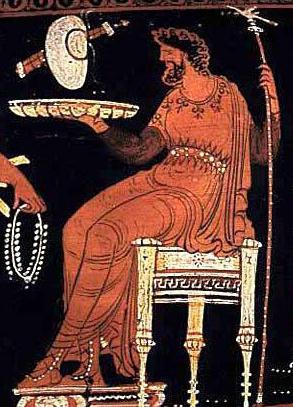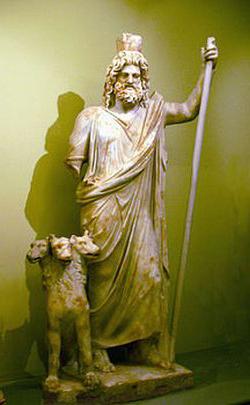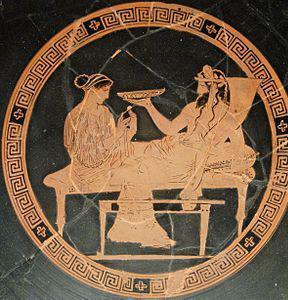Antique Greece is an amazing country. Its highly developed culture has played a huge role in the development of world civilization. The mythological way of thinking inherent in the people of that time gave rise to a religion in which paganism, totemic beliefs, the cult of ancestors and the influence of worldviews of other peoples with which the ancient Greeks came into contact were intertwined in the most bizarre way. The Odyssey and the Iliad, the works of Hesiod, numerous temples, statues of gods, drawings - these are the sources thanks to which we can learn a lot about the great Hellas.
Picture of the world and consciousness
The mythological consciousness of the ancient Greeks and their culture is based on ideas about the Cosmos as a kind of living world. In science, this is called animated-rational cosmology. The universe with planets, stars, constellations, and the Earth itself with all that existed, seemed to them alive, endowed with intelligence and spiritual content. The laws and forces of nature were personified by the Greeks in the images of ancient gods - great and small, in their servants and helpers, heroes and titans. The Greeks perceived the whole world and everything that was happening in it as a grand mystery, as a play played on the stage of a life scene. The actors in it are both the people themselves and the deities who control them. The gods were not too distant from humans. They resembled their appearance, habits, traits, habits. Because the ancient Greeks could challenge them, disobey and win! We will not meet such freedom in other religions.
Divine pantheon
The earliest ancient Greek gods, in particular the god Hades, are associated with the common Indo-European religions that existed in those days. Researchers find many parallels between Indian, for example, and Hellenic celestials. When myths and religion began to weave more and more in the minds of the people, the Greek pantheon was replenished with new "tenants". They became the heroes of myths and legends. So, the primitive pagan cosmogony combined with the religiosity of the later times. And that same Olympus, which we know about from works of art, did not take shape right away with all its inhabitants.
Generations of the Gods

In the ancient Pantheon, it is customary to distinguish between the gods of the older and younger generations. The first is Chaos - darkness and disorder, from which all the rest were born. Earth formed out of chaos - its divine embodiment, the Greeks called Gaia. The goddess of the night - Nikta - with her appearance announced the change of time of day. Gloomy Tartarus became the personification of the word "abyss." Later, from a mythical creature, he will turn into a space of endless darkness, controlled by the god Hades. Eros, the embodiment of love, was born out of chaos. The Greeks considered the children of Gaia and the titan Chronos the second generation of higher powers. They became Uranus - the ruler of the sky, Pontus - the ruler of all inland seas, the god Hades - the owner of the underworld, as well as Zeus, Poseidon, Hypnos and many other Olympians. Each of them had its own “sphere of influence”, its own special relations with each other and with people.
Names of god
God Hades has several own names. The Greeks also called him Hades, and in Roman mythology he is known as Pluto - a huge, lame-footed, dark-skinned, terrible, frightening sight. And finally, Polydegmon (from “poly” - a lot, “degmon” - to contain), that is, “a lot of accommodating”, “a lot of accepting”. What did the ancients mean? Only that the Greek god Hades led the kingdom of the dead. In his "diocese" fell all the souls who left this world. Therefore, it contains “many”, and there are isolated cases when someone could go back. And the definition of “many accepting, recipient of gifts” is associated with this myth: each soul, before moving to its new abode, must pay tribute to the carrier Charon. He is also ruled by the Greek god Hades. So, those coins that give their souls when crossing the Styx go to the treasury of the ruler of the kingdom of the dead. Therefore, by the way, the custom existed in Ancient Greece: to bury the dead with “money”.
Hades in Hades
Why is Hades the god of the dead? How did it happen that the celestial chose such a gloomy abode? Kronos, fearing competition, devoured his children. According to some sources, the same fate befell Hades. According to other scholars of antiquity, a cruel parent threw his child into the abyss of Tartarus. When the younger gods rebelled against the elders, a merciless struggle arose between them. Battles have been waged for more than a thousand years, but Zeus, Poseidon and the other children of Kronos won a long-awaited victory. Then they released the prisoners, overthrew their father and placed him, titans and cyclops in the place of recent prisoners, and they divided the whole world into “spheres of influence”. as a result, Zeus is the lord of heaven and all higher powers, Hades is the god of the underworld, which is also called. Poseidon seized all water elements. The brothers decided to rule in unison, without entering into conflict and without harming one another.
Kingdom of the dead

What is the kingdom of the dead ruled by the ancient Greek god Hades? When a person has to say goodbye to life, Hermes, a messenger in winged sandals, is sent to him. He escorts souls to the banks of the border river Styx, which separates the world of people from the world of shadows, and transfers them to Charon, a ferryman delivering his victims to the underworld. Charon's assistant is Cerberus, a monster dog with three heads and snakes instead of a collar. He makes sure that no one leaves the land of souls and does not return to earth. In the lowest, most remote parts of Hades lies Tartarus, the entrance to which is closed by iron doors. In general, the ray of sun never penetrates into the “kingdom of gloomy Hades”. There is sad, cold, lonely. The souls of the dead roam about him, screaming out the space with loud moans, cries, groans. Their suffering is aggravated by the horror of encounters with ghosts and monsters, lurking in the dark. Therefore, this place of sorrow for people is so hated!
Power attributes

What are the identification marks of the god Hades? He sits in the middle of the main hall of his palace on a luxurious throne of pure gold. Nearby is his wife - always sad, beautiful Persephone. According to legend, this throne was made by Hephaestus, the god of blacksmithing, the patron of crafts, and a skilled craftsman. Aida is surrounded by the viciously hissing Erinnia - the goddess of revenge, secret torment and suffering. No one can hide from them, they torture any person without difficulty to death! Since Hades is the god of the underworld (photos from ancient images you see in our article) of the dead, he was often depicted with his head back to front. This detail artists and sculptors emphasized that he does not look anyone in the eye, they are empty, dead in the deity. Another required attribute of Hades is a magic helmet. He makes his owner invisible. The miraculous armor was presented to the god by the cyclops when he rescued them from Tartarus. God never appears without his omnipotent weapon - two-toothed pitchfork. His scepter is decorated with a figure of a three-headed dog. God drives around in a chariot, where only black horses, like night, are harnessed. The element of the god of the dead, of course, is earth, dust, taking human bodies into its bowels. And the flowers symbolizing Hades are wild tulips. The ancient Greeks sacrificed black bulls to him.
Entourage

But back to the terrifying retinue of Hades. Besides Erinnius, there are always tough, implacable judges next to him, whose names are Radamanf and Minos. Dying people tremble in advance, because they know that their every unrighteous step, every sin will be taken into account at the incorruptible court of Hades, and no prayers will save from retaliation. Huge black wings, similar to those that nature endowed with bats, the same color of a cloak and a sharp sword - this is another resident of Hades - Thanatos, the god of death. It is his weapon that cuts the thread of life of a simple farmer, and a disenfranchised slave, and a powerful king, the owner of countless treasures. Before death, everyone is equal - this is the philosophical meaning of this mythical image. Hypnosis, the god of deep dreams, a handsome young man, is also nearby. He is the twin of Thanatos, therefore, sometimes he sends heavy, deep dreams, about which they say "similar deaths". And, of course, the goddess Hecate, whose very name brings people to awe.
Myths and legends
As with any celestial, many legends and myths are associated with the god Hades. The most famous is about Persephone, daughter of Zeus, and the goddess of land and fertility - Demeter. The story of Orpheus and Eurydice is extraordinarily beautiful. A sad myth about a girl named Mint who had misfortune would please Hades, which caused Persephone to get a fit of anger and jealousy. As a result, we can drink tea with fragrant grass, into which, in fact, the goddess turned the girl! Yes, in that mint garden. We also remember the winged expression about Sisyphean labor, which is directly related to Hades.